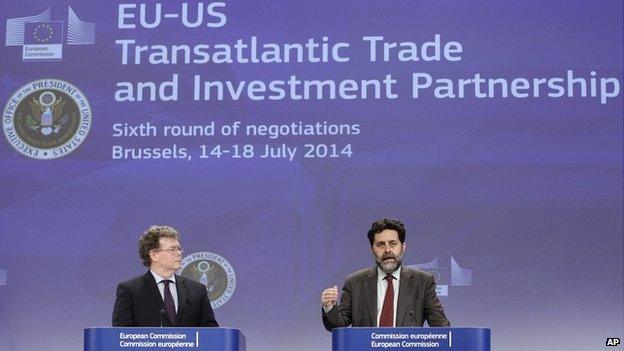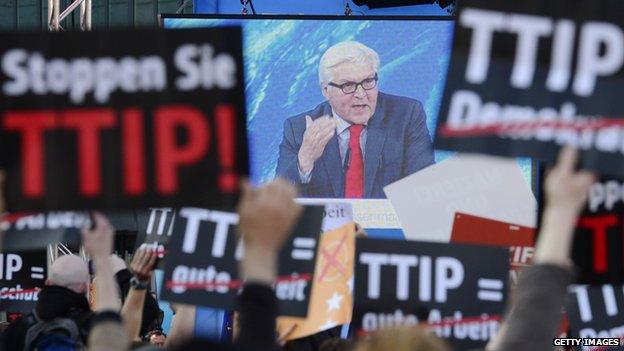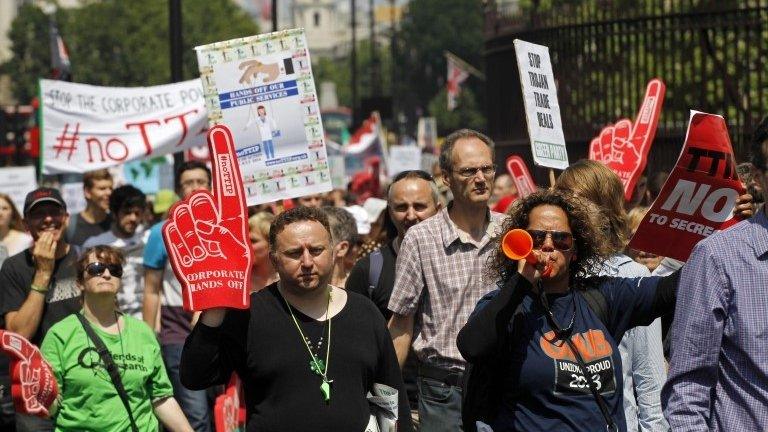EU and US trade talks make 'painstaking progress'
- Published

Talks between the EU and US to make trading between the two easier were launched a year ago
Trade officials from the European Union and the United States have made painstaking progress after a week of negotiations in Brussels.
They are hammering out an agreement to open up Trans-Atlantic commerce.
The project, known as the Trans-Atlantic Trade and Investment partnership, or TTIP (usually pronounced tea-tip) was launched a year ago, and this was the sixth of these week-long intensive sessions the two sides have held.
The aim is to make trade and investment between the US and the EU easier and to boost economic growth in the process.
The subject matter covers import taxes, regulations that impede trade and rules on how foreign investors should be treated.
It's complex, detailed stuff, some would say utterly tedious.
Strong opinions
Certainly, the final press conference, in a European Commission basement, wasn't the obvious choice for a blazing hot Brussels afternoon. But the strength of the responses to TTIP, from business groups that like it and from campaigners who don't, suggest it is potentially very important.
This week has been "highly technical" according to Europe's chief negotiator Ignacio Garcia Bercero, but essential to prepare the ground for more political discussions and decisions that will have to be taken.
We are not yet at the stage of having any massive breakthrough to report, but the talks are moving painstakingly on.
These negotiations have generated some strong opinions - for and against. The negotiators got a flavour of them at what they insisted on calling a "stakeholder event" early in the week.
The first part was rather a conveyor belt, with groups getting a total of nine minutes apiece to make a presentation and answer questions. The chief negotiators from both sides were there, moving between four sets of presentations that were taking place in parallel.
Afterwards, they briefed the stakeholders about the state of the negotiations, but were interrupted when a group in the audience staged a short demonstration before being removed by security officials.
So here's a selection of the views the negotiators heard (business groups are largely in favour of making trade easier, while non-business groups are generally much more sceptical), before the protest.

There have been widespread protests against TTIP based on fears it would give companies too much power
Matt Blunt, president of the American Automotive Policy Council (and former governor of the state of Missouri)
Mr Blunt says that, for carmakers wanting to trade between Europe and the US, "there is a regulatory wall - different sets of standards that have technical differences but we believe achieve the same ultimate result… the same high levels of environmental performance and safety."
Where the "ultimate result" is the same, he wants the two sides to accept each other's standards to reduce costs to exporters.
Harriet Slager of Netherlands Maritime Technology
Ms Slager says that some aspects of US shipping laws are "the most restrictive ever, anywhere in the world".
It's a piece of legislation known as the Jones Act, which dates from 1920 and says that for internal US shipping, vessels must be US built, US crewed, US owned and US flagged.
Ms Slager says it would be good for the US to open up - she argues that the restrictions make it more expensive for American business and for taxpayers when the government is paying to ship goods around the country.
Laurent Zibell of IndustriALL Europe union
Mr Zibell is worried about the idea of mutual recognition of US and EU industrial standards. He says it would allow "an international company to cherry pick the standard that it feels is less stringent… it would be a means for companies to bypass the regulatory system that has been set up in the European Union."
Camille Perrin of the European Consumer Organisation group BEUC
Ms Camille set out the organisation's concerns about food safety. One issue she says is the possibility of European consumers buying hormone-treated American beef and genetically-modified food that is not labelled as such.
Even though European negotiators have said they won't allow that, Ms Perrin says: "When we hear the statements that are made from the US side we can't help but still be worried that everything is still on the table."
Michel Cermak, protestor
Mr Cermak was one of the protestors removed from the event. He described it as a public relations exercise. These events don't make sense he says because the texts discussed by negotiators "are still secret" and "we are having to trust those nice people (the negotiators) who have tricked us in the past".
He says the agreement is likely to be "an open door for big corporations to co-write regulations or contest regulations that are designed in the public interest".
- Published14 July 2014

- Published9 July 2014